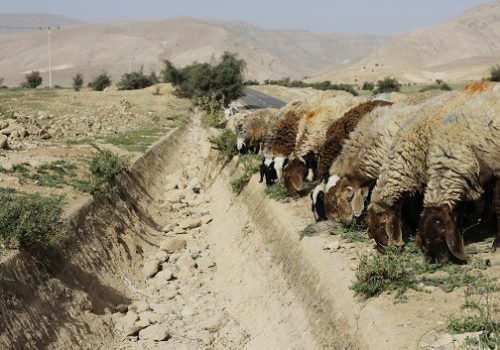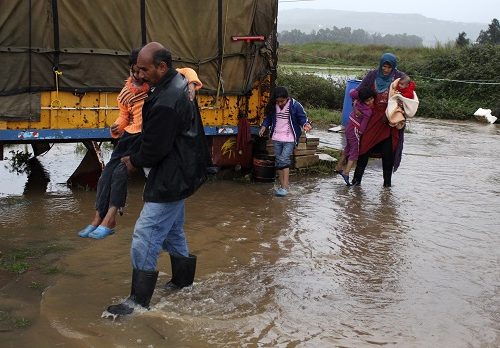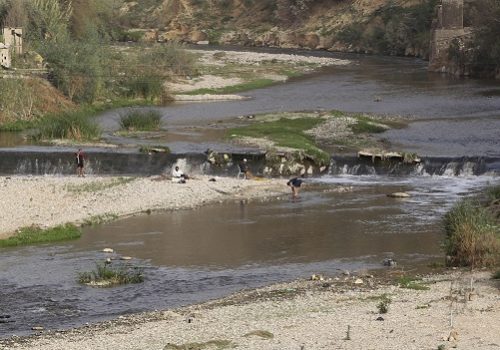Energy cooperation in the Middle East is a necessary step toward regional security
If there is one thing that is certain in the Middle East and North Africa (MENA) region, it is that future stability is uncertain. On top of the coronavirus crisis, there is civil war in Syria, the Israeli-Palestinian conflict, the recent tragic explosion in Beirut, and the ongoing threats posed by global warming. With such prospects, what can be done to secure energy needs in the region in the present and the future?
The key lies in continuing to build and expand on regional cross border energy links. The interconnection of electricity lines and gas pipelines might help mitigate the joint energy shortage challenges that the region faces. Countries must also link energy infrastructure so that they can transport energy to where it is needed most. Only such inter-connectivity can overcome threats posed to regional energy security, whether manmade or natural.
Is it sustainable that, while Tel Aviv residents enjoy 24/7 electricity, Gazans ninety kilometers away sit in the dark for more than half the day? Does it make sense that Palestinians, who are among the most economically challenged in the region, rely on the most expensive electricity, using diesel in the Gaza Strip? As Lebanon is thrust into even deeper economic woes, why do the Lebanese people have to generate electricity using expensive power barges? Why must blackouts be the norm in Iraq despite the abundance of natural resources?
No state can be secure as long as its neighbor’s basic energy and water needs are not met.
While the MENA region faces many challenges to stability, one important mitigating factor could be the abundance of natural resources, if used wisely. This could be the basis for cooperative, cost-efficient generation of electricity from both conventional energy sources, such as natural gas, and unconventional sources, including renewables.
Ideally, the MENA region should be generating most of its electricity from clean sources. One of the main natural resources it enjoys in abundance is the sun. Thus, solar energy holds the key to a brighter and more sustainable solution for the region. Many of the most attractive solar panel projects are actually coming from the oil-rich Gulf, with the United Arab Emirates setting an example both in terms of actual projects and innovation. Impressive renewable energy projects in Jordan and Egypt can be emulated in the Palestinian territories, which is compelling considering the potential. Importantly, this will require cooperation and support from Israel, which is making its own strides in the renewable energy sphere.
As countries seek to diversify their sources of electricity generation, it is worth noting that nuclear energy is re-emerging as a significant source after advancements in safety measures and the adoption of state-of-the-art technologies in recent years. The United Arab Emirates is one example of this.
Natural gas offers much cleaner fuel than diesel or coal and exists in abundance in the MENA region. As such, natural gas constitutes an optimal transitional fuel towards cleaner renewable sources. A transitional fuel is necessary so that basic electricity needs of developing countries are met and electricity grids have been upgraded sufficiently to enable the off-take of the electricity generated from renewable energy.
The natural gas discoveries in the Eastern Mediterranean offshore Egypt, the Gaza Strip, and Israel, among others, offer a unique opportunity for energy cooperation in the region and beyond. The key lies in developing these resources and in constructing the means for delivering them to consumers in the region and beyond.
The establishment of the EastMed Gas Forum in Cairo in January 2019 under Egyptian sponsorship is a step in the right direction, recognizing not only the importance of the gas reserves of the Eastern Mediterranean, but also the need for cooperation in developing and transporting the gas to regional and international consumers. Turkey is noticeably absent from this Forum and has contested the rights of some of the Forum members to their gas reserves (despite US and EU rejection of the Turkish claims). This may actually further strengthen alliances within the Forum, as members seek to ward off any Turkish threats to their gas reserves.
The Gaza Marine gas field needs to be developed alongside other fields currently in development off the coasts of Egypt and Israel. This is so that Palestinian consumers of electricity in the Palestinian territories will benefit from this natural resource alongside Israeli consumers benefitting from gas from the Tamar, Leviathan, Tanin, and Karish gas fields. Moreover, the planned regional networks of gas pipelines, such as the Gas for Gaza pipeline to the Gaza Strip, the gas pipeline to Jenin, and the Israeli pipelines to Jordan and Egypt, are the means through which gas from these offshore sources can be delivered to consumers.
While cross-border energy projects cannot possibly be erected without enduring political support, they must transcend politics for the sake of the future of energy security in the region. And, although cross-border energy projects are not a substitute for political solutions for the Palestinian territories or elsewhere, they can constitute an important backbone of state building and regional cooperation efforts. Energy projects can help ensure that basic future energy needs are met, especially when considering political uncertainties throughout the region. Furthermore, establishing energy security will be critical in guaranteeing water security.
It is likely that the regional wars of the future will be over depleting water resources, which cannot possibly be addressed unless there is sufficient energy to desalinate and pump water to help meet the growing demand. This threat is being compounded by the already visible impacts of climate change in the region, which are set to worsen as more energy will be required for residential cooling purposes, agriculture, and industry.
The solution to these energy challenges lies in developing these natural resources and in establishing a network of energy infrastructure that consists of gas pipelines and electricity lines constructed across the region. Building on the Arab gas pipeline and the Arab electricity grid is important. The recent upgrade of the electricity connection between Jordan and the West Bank is also encouraging in this regard.
In commercial terms, the acquisition of Noble Energy by Chevron could serve to incentivize more ambitious regional deal-making considering Chevron’s global strength and footprint in the MENA region.
Putting in place the necessary energy building blocks today will help ensure that an eight-year-old child in Gaza or Beirut need not sit in the dark doing homework by candlelight—a hazard that costs lives annually in Gaza and elsewhere—in the future. Experience has shown that mutual dependencies can help mitigate political tensions, creating incentives to cooperate and possibly facilitating a positive momentum towards solving some of the MENA region’s thornier outstanding political conflicts.
Ariel Ezrahi is the Director of Energy at the Office of the Quartet in Jerusalem. His views do not reflect those of his employer.
Image: A Palestinian engineer gestures as he stands next to solar panels in Tubas, in the occupied West Bank July 23, 2018. VIA REUTERS/Mohamad Torokman


